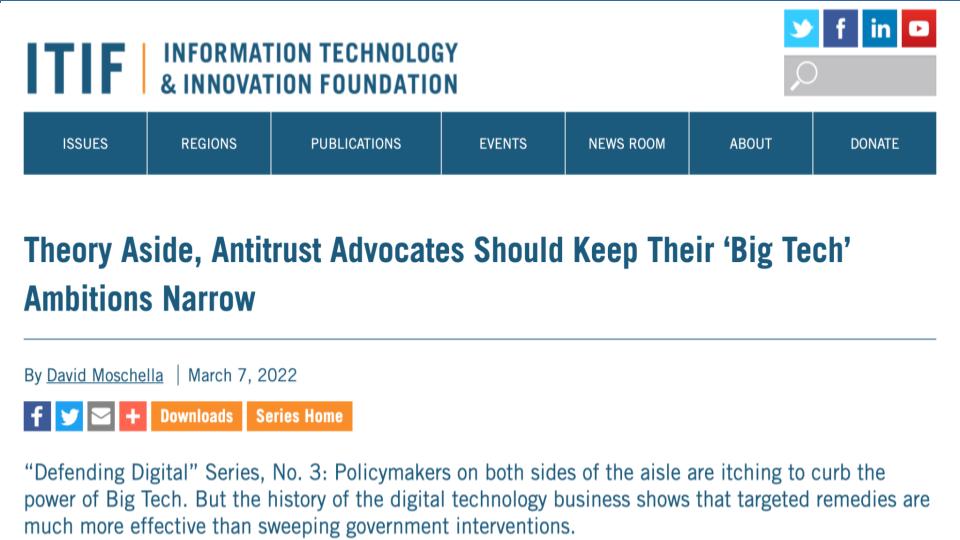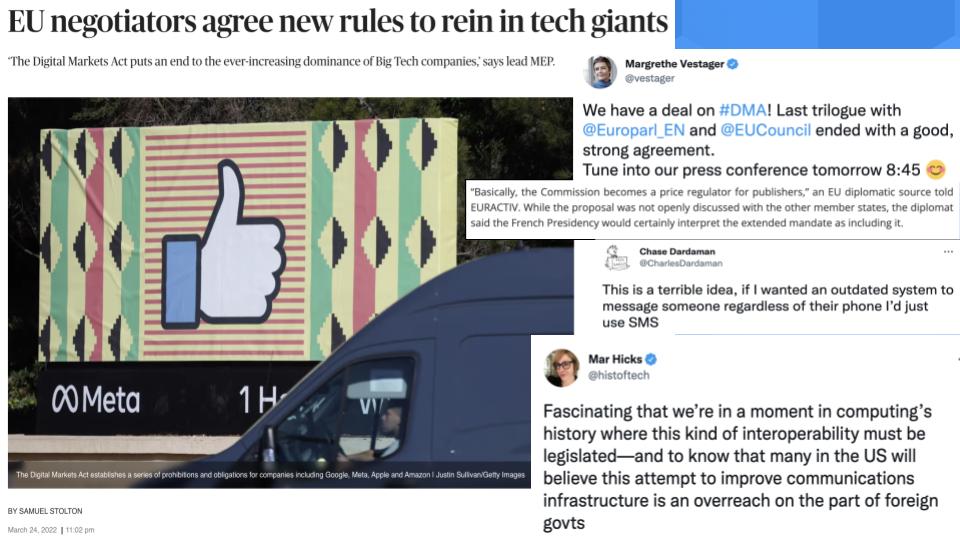There are very few political issues that get bipartisan support these days, never mind consensus spanning geopolitical boundaries. But whether we’re talking across the aisle or over the pond, there seems to be common agreement that the power of big tech firms should be regulated.
However, the government’s track record when it comes to antitrust aimed at tech is mixed, at best. History shows that market forces, rather than public policy, have been much more effective at curbing monopoly power in the technology industry. Moreover, the standard for antitrust action has always been demonstrating consumer harm. Many of today’s policy makers are challenging that notion and using market dominance and the potential for consumer harm as the new benchmark for intervention.
In this week’s Breaking Analysis, we welcome frequent CUBE contributor David Moschella, author and senior fellow at the Information Technology and Innovation Foundation. We explore several issues, including the track record of governments’ antitrust actions against big tech, what types of remedies have been and can be most effective and a first-pass assessment of the new rules European Union regulators just agreed upon to try to rein in big tech companies.
Does inherent market power warrant government action?
In a recent article for ITIF entitled “Theory Aside, Antitrust Advocates Should Keep Their ‘Big Tech’ Ambitions Narrow,” Moschella argued that big sweeping changes to moderate power in the tech industry, such as breaking apart companies, have been ineffective compared with market forces.
Moschella doesn’t argue that government’s shouldn’t be involved. Rather, he suggested that more targeted measures, combined with market forces, are the right answer. He also called into question new philosophical debate whereby market power, not consumer harm, is the new standard by which government’s should act against big tech companies.
We asked Moschella to explain the impetus for his work and the recent article.
First, let’s go back to that title. When I said, theory aside, that is referring to a huge debate that’s going on in global antitrust circles these days about whether antitrust should follow the traditional path of being invoked when there’s real harm, demonstrable harm, to consumers or a new theory that says that any sort of vast monopoly power inevitably will be bad for competition and consumers at some point. So you’re best to intervene now to avoid harms later. And that school, which was a very minor part of the antitrust world for many, many years is now quite ascendant and the debate goes on. It doesn’t matter which side of that you’re on. The question is really, if you’re going to do something to take on big tech – and clearly many politicians and regulators are itching to do something – what would you actually do? And what are the odds that that’ll do more good than harm? And that was really the origin of the piece with a historical view of that.
This philosophical debate, which Moschella refers to in his piece as popularized by Neo-Brandeisians, is sometimes colloquially referred to as “hipster antirust.”
Digging deeper into the history of US antitrust actions
There’s a 50-plus-year history of antitrust action against big tech and plenty of data on the topic. The slide below shows the three historical targets in the tech business and the five most prominent new firms.
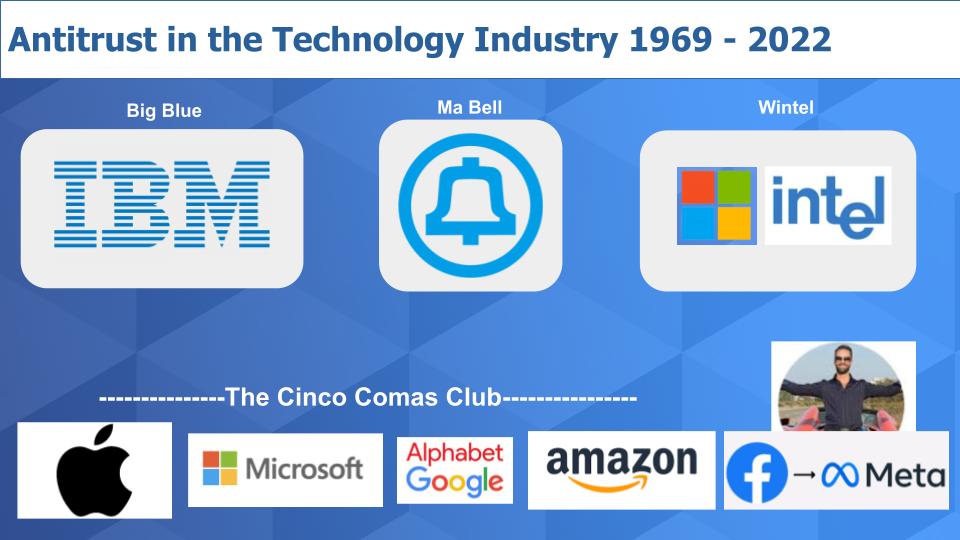
In 1969 the DoJ went after IBM Corp. – “Big Blue” – and dropped its suit 13 years later. In 1984, the government broke up “Ma Bell” and in the late 1990s went after Microsoft Corp. and the “Wintel” monopoly. Earlier this year, in an interview with tech journalist Kara Swisher and Andrew Ross Sorkin, Federal Trade Commission Chair Lina Khan clearly articulated her position, which reflects the thinking of the new Brandeis movement. In this discussion, Khan claimed the government played a major role in moderating the power of tech giants historically, essentially saving the industry from the dominance of companies such as Microsoft.
We asked Moschella to comment on the efficacy of government intervention in these instances. What were the outcomes and the consequences?
IBM and AT&T
It’s a big topic and there’s a lot there and a lot of history, but I might just introduce it by saying, for whatever reasons, antitrust has been part of the entire information technology industry history from mainframe to the current period and that slide expresses that fact. The known reasons for that are the economies of scale, network effects, lock-in, safe choices – many things that explain it. But the good bit about that is we actually have so much history of this and we can at least see what’s happened in the past, and when you look at IBM and AT&T, they both were massive antitrust cases.
The one against IBM was dropped and it was dropped in the early 1980s. Well, what was going on at that time? IBM was considered invincible and unbeatable, but it was 1981 that the personal computer came around and within just a couple of years the world could see that the computing paradigm had change from mainframes and minis to PCs, LANs and client-server. So IBM, in just a couple of years, went from being unbeatable, you can’t compete with them, we have to break them up, to being incredibly vulnerable and in trouble. And IBM never fully recovered and is sort of a shell of what it once was. So the market took care of that and no action was really necessary just by everybody thinking there was a need.
In the case of AT&T, they did act and they broke up the company and I would say, first question is, was that necessary? Well, lots of countries didn’t do that and the reality is breaking AT&T up into long-distance and regional may have made some sense in the early 1980s, but by the 1990s it was pretty clear that the telecom world was going to change dramatically from long-distance and fixed-wires services to internet services, data services, wireless services and all of these things that we’re going to restructure the industry anyway. But AT&T to me is very interesting because of the unintended consequences. And I would say that the main unintended consequence of that was America’s competitiveness in telecommunications took a huge hit.
And to this day, telecommunications is dominated by European, Chinese and other firms. And the big American players of the time [were] AT&T [and] Western Electric became Lucent. Lucent is now owned by Nokia and is really out of it completely and, most notably and compellingly there’s Bell Labs. Bell Labs, once the world’s most prominent research institution, now is also a shell of itself, and as part of Lucent is also now owned by the Finnish company Nokia. So that restructuring greatly damaged America’s core strength in telecommunications hardware and research and one can argue we’ve never recovered right through to 5G today. So it’s a very good example of the market taking care of the big problem. But meddling led to some unintended consequences that have hurt the American competitiveness and … you can see some of that going on again today and in the past with Microsoft and Intel.
Listen to David Moschella’s perspectives on the antitrust actions against IBM and AT&T.
Now, of course, as many people know, IBM unwittingly handed its monopoly to Intel Corp. and Microsoft by outsourcing the microprocessor and operating system respectively to these two companies. And it ended with IBM agreeing to take OS/2, its proprietary operating system, and giving Intel Windows, not realizing that its ability to dominate a new and disruptive market such as PCs and operating systems had been vaporized by the Wintel ecosystem.
The government wanted to break Microsoft apart and split its operating system business from application software. In the case of Intel, the company only had one dominant business – microprocessors – so it couldn’t be broken apart.
We asked Moschella to take us through the antitrust history of Microsoft and Intel, and the consequences of government action.
Microsoft and Intel
Well, the Microsoft one is sort of a classic because the antitrust case against it was raging in the mid-’90s and up to 1998, when it finally ended. Once again, everybody said, Bill Gates was unstoppable, no one could compete with Microsoft, they’d buy them, destroy them, predatory pricing, the attacks on Netscape… all sorts of things. But those were the very years when it was becoming clear first that Microsoft basically missed the early big years of the internet and then again, later missed all the early years of the mobile phone business going back to BlackBerrys and Pilots and all those sorts of things. So here we have the government making the case that this company is unstoppable and you can’t compete with them at the very moment they’re entirely on the defensive.
And therefore it wasn’t surprising that that suit eventually was dropped with some minor concessions about Microsoft making it a little bit easier for third parties to work with them and treating people a little bit more even-handedly. Perfectly good things that the government forced Microsoft to do. But again, the market took care of the problem far more than the antitrust activities did.
The Intel one is also interesting because it’s sort of like the AT&T one. On the one hand, antitrust actions made Intel much more likely and in fact required it to work with AMD enough to keep AMD in business. And having AMD lowering prices for consumers certainly sped up innovation in the personal computer business and appeared to have a lot of benefits for those early years.
But when you look at it from a longer point of view and particularly when look at it again from a global point of view, you see that, wow, that may not be so clear because that very presence of AMD meant that there’s a lot more pressure on Intel in terms of its pricing, its profitability, its flexibility and its volumes — all the things that have made it harder for them to compete with chips made in Taiwan, let alone build them in the United States. And therefore that long-term effect of essentially requiring Intel to allow AMD to exist has undermined Intel’s position globally and arguably has undermined America’s position in the long run.
And certainly Intel today is far more vulnerable to Arm and Nvidia, other specialized chipmakers, to China, to Taiwan, all of these things are going on out there. Intel is less capable of resisting that than they would’ve been otherwise. So, you thought we had some real benefits with AMD and lower prices for consumers, but the long-term unintended consequences are arguably pretty bad.
Listen to David Moschella’s perspectives on the antitrust actions against Microsoft & Intel.
The Big Five are powerful, but are they monopolies?
Now we come to 2022 and there are five companies with antitrust targets on their backs – although Microsoft perhaps seems to be the least susceptible to U.S. government intervention this time around.
In the chart above we show the “Cinco Comas Club” in an homage to Russ Hanneman of the show Silicon Valley. Apple Inc., Microsoft, Google LLC (Alphabet Inc.) and Amazon.com Inc. Each has a trillion dollar-plus valuation. Meta Platforms Inc. (Facebook), while briefly crossing that threshold, like Mr. Hanneman, lost a comma in its valuation and is now well under that market cap. But Meta remains under serious fire nonetheless.
People often don’t realize the immense monopoly power that IBM had, which, relatively speaking (when measured in percent of industry revenue or profit), dwarfed that of any company in tech, ever. But the industry was much smaller then and there was no internet or cloud.
We asked Moschella: Does this era call for a different approach this time around? How should we think about these five companies, their market power and the implications of government action?
If you go back to the old days, IBM had around 70% of the computer business globally and AT&T had 90% or so of the American telecom market. These are market shares that today’s players can only dream of. Intel and Microsoft had 90% of the personal computer market. And then you look at the Big Five… as wealthy and as incredibly successful as they’ve been, you sort of have almost the argument that’s wrong on the face of it. How can five companies, all of which compete with each other to at least some degree, how can they all be monopolies? And the reality is they’re not monopolies, they’re all oligopolies that are very powerful firms, but none of them has an outright monopoly on anything. There are competitors in all the spaces that they’re in and probably increasingly so. And so I think people conflate the extraordinary success of the companies with this belief that therefore they are monopolists, and I think they’re far less so than those in the past.
Listen to David Moschella’s perspectives on the Big Five.
Amazon’s and Microsoft’s cloud dominance
Let’s do a quick drill-down into cloud computing. It’s a key component of digital business infrastructure. In his book “Seeing Digital,” Moschella coined a phrase, “the Matrix,” referring to the key technology platforms on which people will build digital businesses. We joked that Moschella should have called it Metaverse, since he was way ahead of his time.
Cloud infrastructure is a key layer of the metaverse and two companies dominate as shown in the ETR graphic below.
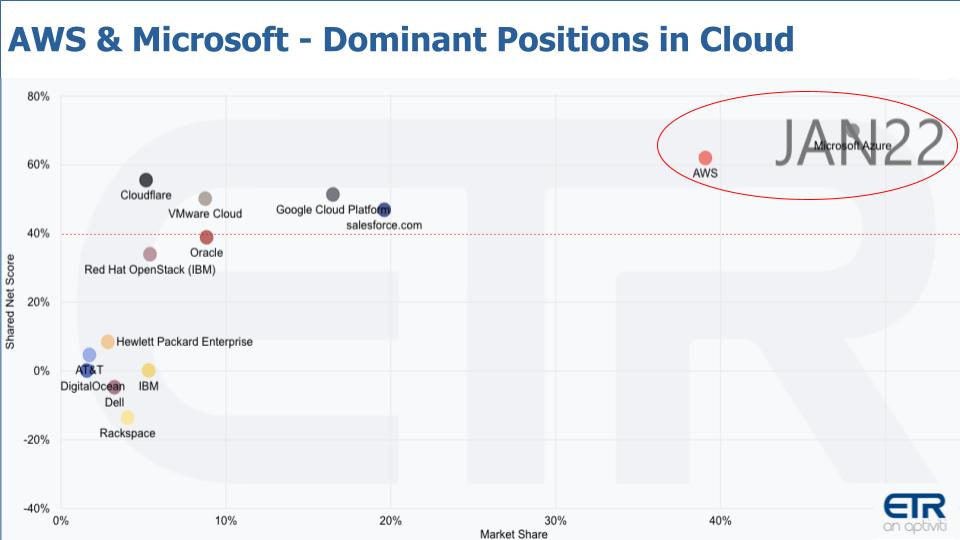
In the graphic above, we show spending momentum or Net Score on the vertical axis and Market Share or pervasiveness in the Enterprise Technology Research data set on the horizontal axis. And we’ve put a dotted red line at 40%, which indicates elevated customer spending. And you can Microsoft in the upper right with AWS, and those two dominate the cloud — far ahead of the pack, including Google Cloud.
Microsoft is prominent or often dominant in many other businesses, as is AWS to a lesser extent. Examples include productivity software, collaboration, database, security, videoconferencing, analytics, infrastructure software, marketing tech (LinkedIn), developers (GitHub) and gaming, among others.
Alphabet’s business is dominated by advertising and we don’t have similar spending data on this sector or on Apple and Facebook, but we know those companies dominate their respective businesses.
But to Moschella’s point, they compete with each other in many of these areas and none has a monopoly. However, it doesn’t mean they shouldn’t be monitored and put in check.
The resources of the Big Five are enormous
Just to give you a sense of the magnitude of these companies, below is a table with some financial data worth looking at briefly.
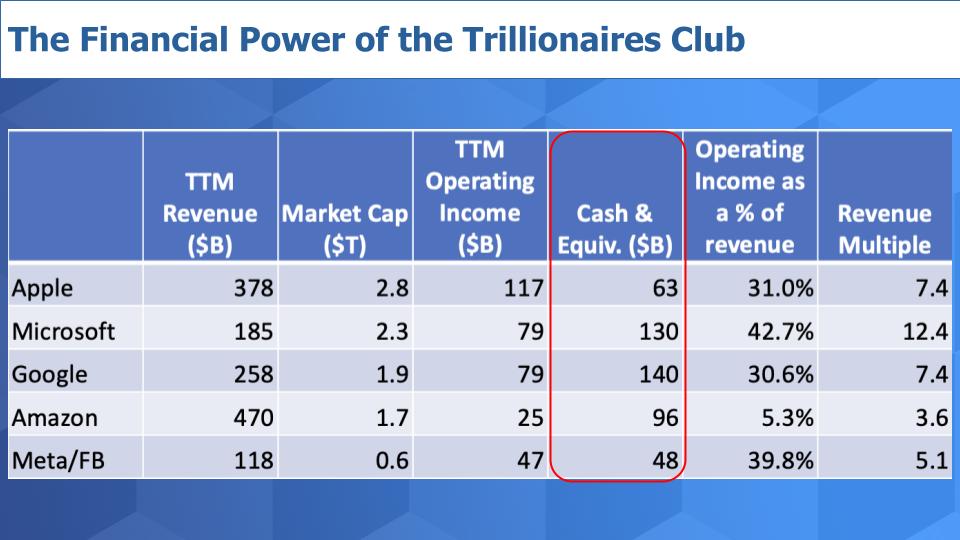
The table above ranks the companies by market cap in trillions – the second column. Everyone is in the trillionaires club except Meta. And each has revenue well over $100 billion, Amazon approaching a half-trillion dollars in revenue. The operating income and cash positions are just mind-boggling. And we’ve called out the cash equivalents, which are each comparable or well above the revenues of highly successful tech companies such as Cisco Systems Inc., Dell Technologies Inc., Hewlett Packard Enterprise Co., Oracle Corp., Salesforce.com Inc. and the like.
And these companies are extremely profitable from an operating income standpoint, with the clear exception of Amazon – we’ll come back to that in a moment. And we show the revenue multiple in the last column — Apple, Microsoft and Google — just insane for such large firms.
And there are other equally important metrics such as capital spending, which sets the stage for future scale… and other measures.
Moschella offered the following perspective on the might of these firms:
Yeah, including research and development where those companies are spending hundreds of billions of dollars over the years. And I think it’s easy to look at those numbers and just say, this doesn’t seem right, how can any companies have so much and spend so much? But if you think of what they’re actually doing, those companies are building out the digital infrastructure of essentially the entire world.
I remember once meeting some folks at Google, and they said, beyond AI, beyond search, beyond Android, beyond all the specific things we do, the biggest thing we’re actually doing is building a physical infrastructure that can deliver search results on any topic in microseconds and the physical capacity they’ve built requires that kind of spending. And when people start saying, well, we should have lots and lots of smaller companies well, that sounds good, yeah, it’s all right, but where are those companies going to get the money to build out what needs to be built out? And every country in the world is trying to build out its digital infrastructure and some are going to do it much better than others.
Double-clicking on Amazon’s profit picture
Let’s come back to Amazon for a bit. Notice the company’s comparatively tiny operating profit as a percentage of revenue in the previous chart. Amazon is like Jeff Bezos’ giant lifestyle business. it has never been that profitable — like most retail — but the increasing importance of Amazon’s cloud business comes into focus in the chart below.
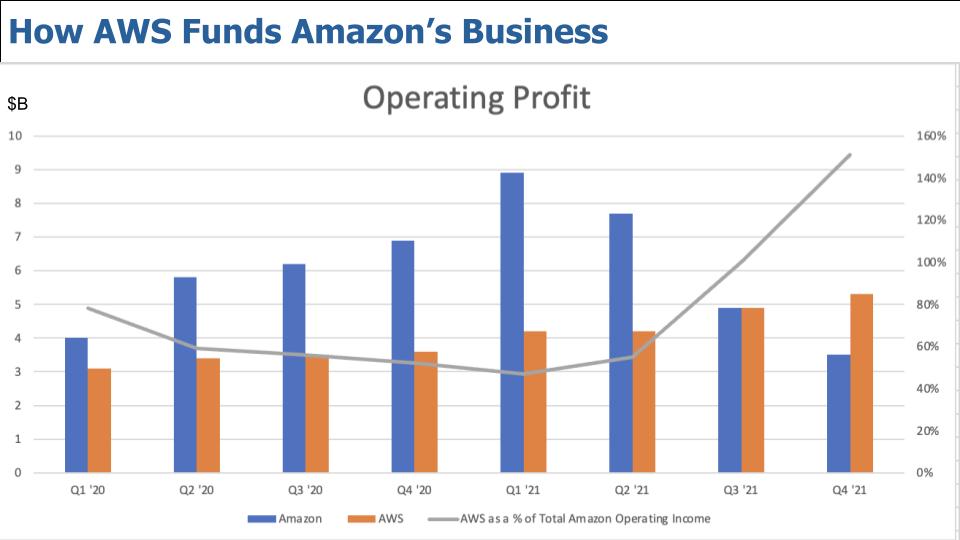
This data above shows Amazon’s operating profit in the blue bars and AWS’ in the orange. And the gray line is the percentage of Amazon’s total operating profit that comes from AWS on the rightmost axis. This dynamic is well-known, but the recent trends are dramatic. Last quarter AWS contributed well over 100% of Amazon’s overall operating profits. This underscores the power of AWS and the horrendous margins in retail. AWS is funding Amazon’s entrance into new markets like grocery, movies… and Bezos’ moves into space.
What could disrupt Amazon?
Late last year, theCUBE collaborated with Moschella to understand what, if anything, could disrupt Amazon. We developed a number of scenarios and asked our community to rate the likelihood of each of the below scenarios in terms of its probability of disrupting Amazon – with 10 highly likely. On average the score was a 6.0, with complacency, arrogance, blindness and the like — self-inflicted wounds essentially — taking top spot with a score of 6.5. We felt this supported the idea that the market will ultimately decide the fate of Amazon.
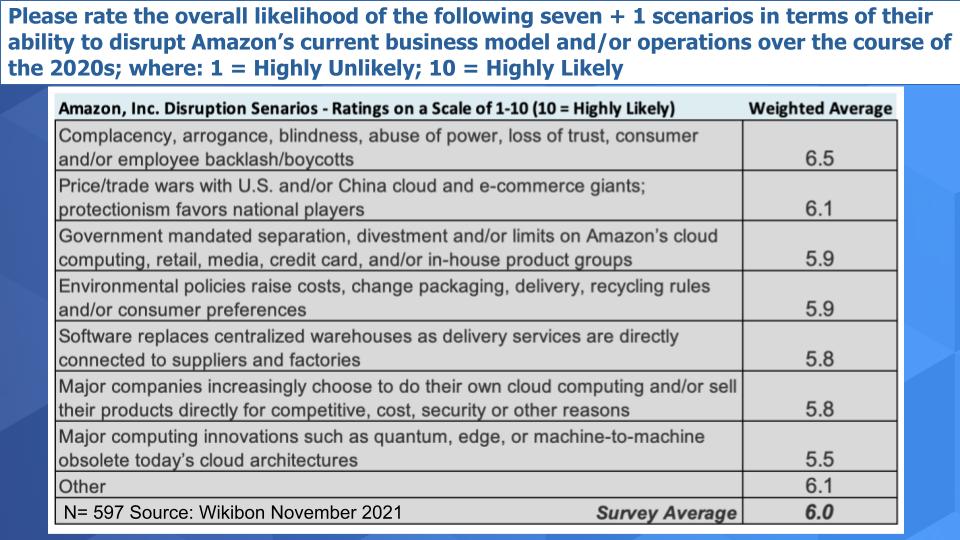
We asked Moschella if breaking up Amazon is the right formula – why or why not?
There’s a couple of things there. The first is the irony that when people in the regulatory world talk about the power of Amazon, they almost always talk about their power in consumer markets, whether it’s books or retail or impact on malls or Main Street shops or whatever. And as you say, they make very little money doing that. People almost never look at the big cloud battle between Amazon, Microsoft and to a lesser extent Google, Alibaba and others. — even though that’s where they have by far the highest market share and pricing power. So the regulatory focus is sort of weird, but you know, the consumer stuff obviously gets more appeal to the general public.
But that survey you referred to was interesting to me because one of the challenges. I said to myself: OK, well, if I’m going to take that IBM case, AT&T case, Microsoft’s case, in all those situations the market was the one that actually minimized the power of those firms and therefore the antitrust stuff wasn’t really necessary. Well, how true is that going to be again? Just because it’s been true in the past doesn’t mean it’s true now. So what are the possible scenarios over the 2020s that might make it all happen again? And so each of those scenarios were questions that we put out to others. But the ones that to me were by far are the most likely is the traditional one of company cultures getting fat and happy. That’s always the case, but the more specific one, I think by far in terms of a threat, is China.
You know, Amazon retail is a low-margin business. It would be vulnerable if it didn’t have the cloud profits behind it, but imagine a year from now, two years from now, trade tensions with China get worse and Christmas comes along and China just says, well, you know, American consumers if you want that new exercise bike or those new shoes or clothing, anything that we make well, actually that’s not available on Amazon right now, but you can get that from Alibaba. And maybe in America that’s a little more farfetched, but in many countries all over the world, it’s not farfetched at all. And so the retail division’s vulnerability to China just seems pretty obvious.
Another possible disruption: Amazon has spent billions and billions with their warehouses and their robots and automated inventory systems and all the efficiencies that they’ve done there. But you could argue that maybe someday that’s not really necessary. You have search, which finds where a good is made, and a logistical system that picks that up and delivers it to customers, and why do you need all those warehouses anyway? So those are probably the two top ones, but there are others.
I mean, a lot of retailers, as they get stronger online, maybe they start pulling back some of the premium products from Amazon and Amazon takes their cut of 30% or so, so people might want to keep more of that in house. You see some of that going on today. So the idea that the Amazon is invulnerable to disruption is probably wrong.
What are the scenarios for Google or Apple or Microsoft? Will these companies be disrupted as they have in the past? Well, you can’t say for sure, but the scenarios are certainly plausible and I certainly wouldn’t bet against it. That’s what history tells us. And it could easily happen once again and therefore, the antitrust should at least be cautionary and humble and realize that maybe they don’t need to act as much as they think.
Listen to David Moschella’s perspectives on what could disrupt Amazon.
The EU takes aim at big tech
Moschella is not arguing for laissez faire. He’s pushing for remedies that are more narrow in scope. Notably, the EU just this past week announced new rules to limit the power of tech companies in a series of many more narrow moves. We show an article explaining the new rules and some comments to the right.
The regulators took to social media to announce a victory and the press conference was a backslapping fest. But the comments were mixed. Some folks applauded but we saw many comments – some we show here – that say this is a horrible idea that was rushed together and will, like most such efforts, result in unintended consequences.
We had to chime in on Twitter and question whether the EU would have taken these actions if European companies were dominating the market.
This is serious stuff. They’re talking about applying what appear to be more narrowly defined restrictions – although perhaps too many of them – to any company with a market cap of more than 75 billion Euros or turnover over 7.5 billion Euros. And imposing huge penalties for violations – up to 20% of annual revenue for repeat offenders – wow!
We asked Moschella what he makes of this development. Is this an application of more narrow restrictions along what he proposes? Did the EU get it right?
Let’s break that down a little bit. Start with a little bit of history again and then get to Europe because, although big sweeping breakups of the type that were proposed for IBM, Microsoft and all weren’t necessary, that doesn’t mean that the government didn’t do some useful things, because they did. In the case of IBM, government forces in Europe and America basically required IBM to make it easier for companies to make peripherals like disk drives and printers that worked with IBM mainframes. They made IBM unbundle its software pricing and that made it easier for database companies and others to sell their products. With AT&T it was the government that required AT&T to actually allow other phones to connect to the network, something AT&T argued at the time would destroy security, but it was the government that required them to allow MCI, the long-distance carrier, to connect to the AT&T network for local delivery.
And with Microsoft and Intel, the government required them to at least treat their suppliers more even-handedly in terms of pricing and policies and support and such things. So the lessons out there is the big stuff wasn’t really necessary, but the little stuff actually helped a lot and I think you can see the scenarios and argue in the piece that there’s little stuff that can be done today in all the cases for the Big Five, there are things that you might want to consider. The companies aren’t saints. They take advantage of their power, they use it in ways that sometimes can be reigned in and make it better off overall.
And so that brings us to the European piece of it. And to me, the European piece is much more the bad scenario of doing too much than the wiser course of trying to be narrow and specific.
What they’ve basically done is they have a whole long list of narrow things that they’re all trying to do at once. So they want Amazon not to be able to share data about its selling partners and they want Apple to open up their App Store and they don’t want Google to be able to share data across its different services, Android, search, mail or whatever. And they want to force Facebook to open up to other messaging services. And they want to do all these things for all the big companies, all of which are American, and they want to do all that starting next year.
And to me that looks like a scenario of a lot of difficult problems done quickly. All of which might have some value if done really, really well, but all of which have all kinds of risks for the unintended consequences we’ve talked about before and therefore they seem to me being too much too soon — and the sort of problems we’ve seen in the past. And frankly to really say that, I mean, the Europeans would never have done this to the companies if they’re European firms. They’re doing this because they’re all American firms and the sort of frustration of Americans dominance of the European tech industry has always been there going back to IBM, Microsoft, Intel and all of them.
But it’s particularly strong now because the tech business is so big. And so I think the politics of this at a time where we’re supposedly all this great unity of America and NATO and Europe in regard to Ukraine, having the Europeans essentially go after the most important American industry brings in the geopolitics, I think in an unavoidable way. And I would think the story is going to get pretty tense over the next year or so and as you say, the Europeans think that they’re taking massive actions, they think they’re doing the right thing. They think this is the natural follow-on to the GDPR and even a bigger version of that and they think they have more to come. And they see themselves as the people taming big tech not just within Europe, but for the world and absent any other rules, they may pull that off. I mean, GDPR has indeed spread despite all of its flaws. So the European thing, which doesn’t necessarily get huge attention here in America, is certainly getting attention around the world and I would think it would get more, even more going forward.
Listen to David Moschella’s take on the EU’s recent actions against big tech.
The concern for the U.S. is that policy makers in America will sit idle while European negotiators decide the future of big tech. Although we advocate for controls that level the playing field, perhaps narrowly applied and monitored carefully, we propose a more balanced approach that protects consumers and competitors, while at the same time preserving the competitiveness of the U.S. overall.
Keep in touch
Thanks to Stephanie Chan, who researched several topics for this episode, and Alex Myerson on production. Alex handles the podcasts and media workflows. And special thanks to Kristen Martin and Cheryl Knight who help us keep our community informed and get the word out, and to Rob Hof, our editor-in-chief at SiliconANGLE.
Remember we publish each week on Wikibon and SiliconANGLE. These episodes are all available as podcasts wherever you listen.
Email [email protected], DM @dvellante on Twitter and comment on our LinkedIn posts.
Also, check out this ETR Tutorial we created, which explains the spending methodology in more detail. Note: ETR is a separate company from Wikibon and SiliconANGLE. If you would like to cite or republish any of the company’s data, or inquire about its services, please contact ETR at [email protected].
Here’s the full video analysis:
All statements made regarding companies or securities are strictly beliefs, points of view and opinions held by SiliconANGLE media, Enterprise Technology Research, other guests on theCUBE and guest writers. Such statements are not recommendations by these individuals to buy, sell or hold any security. The content presented does not constitute investment advice and should not be used as the basis for any investment decision. You and only you are responsible for your investment decisions.

